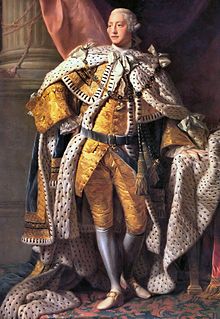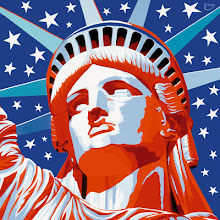In 1776, at the time of the declaration of Independence, the British Monarchy was the most splendid, the grandest, the most formidable political institution known to man. At its peak the British Empire spanned a quarter of the globe, and a mere change in gesture of a single King would determine the fate of millions around the world.
It was in the wake of the absolute reign of the British King, the founders risked, as they would have liked to tell us, "Their Lives, Their Fortunes, and Their Sacred Honors" to craft a revolution, a struggle which would eventually culminate into the foundation of an independent and sovereign American Republic, not of subjects, but of a prosperous, free and self-reliant body of citizens. At the very heart and purpose of these United States of America was the fulfillment of two noble promises: to its own people, an oath of "Life, Liberty and the Pursuit of Happiness" and to the rest of mankind of, "Peace, Commerce, and honest friendship with all nations, entangling alliances with none."
Yet both vows have been broken. People have been deprived of their Life, Liberty and Happiness. So far and distant does the federal government stand from "Peace and Honest friendship" with other nations, that propping foreign dictators, brutal suppression of the liberties of its own people, Economic coercion, perpetual and endless wars seems to be the Federal Governments only known language of conduct and discourse.
" There is hardly any part of the system which could have been attended with greater difficulty in the arrangement of it than this; and there is, perhaps, none which has been inveighed against with less candor or criticized with less judgment."
"Here the writers against the Constitution seem to have taken pains to signalize their talent of misrepresentation. Calculating upon the aversion of the people to monarchy, they have endeavored to enlist all their jealousies and apprehensions in opposition to the intended President of the United States; not merely as the embryo, but as the full-grown progeny, of that detested parent. To establish the pretended affinity, they have not scrupled to draw resources even from the regions of fiction. The authorities of a magistrate, in few instances greater, in some instances less, than those of a governor of New York, have been magnified into more than royal prerogatives. He has been decorated with attributes superior in dignity and splendor to those of a king of Great Britain. He has been shown to us with the diadem sparkling on his brow and the imperial purple flowing in his train. He has been seated on a throne surrounded with minions and mistresses, giving audience to the envoys of foreign potentates, in all the supercilious pomp of majesty."
Fast-forward 200 years and the world seems to be turned on its head. The reality of the 21st century, ironic as it is, has vindicated the anti-federalists in almost every aspect of the constitutional debate. Whereas, the British Empire has long disappeared and the monarchy largely ceremonial, with the crown being vested in a harmless old lady who spends her days merely giving slick speeches to keep up the well dressed image of a fast fading past; the U.S president has usurped and furnished himself with majesty and powers of such great magnitude that juxtaposed with the then King of Britain, ruler of a quarter of the globe, the U.S president may very well be said to be the King of the ENTIRE Earth.
"The President of the United States would be liable to be impeached, tried, and, upon conviction of treason, bribery, or other high crimes or misdemeanors, removed from office; and would afterwards be liable to prosecution and punishment in the ordinary course of law. The person of the king of Great Britain is sacred and inviolable; there is no constitutional tribunal to which he is amenable; no punishment to which he can be subjected without involving the crisis of a national revolution."
Now, what good is a provision of impeachment which is simply hardly ever used and that too for the wrong reasons?
In our times there is only one president who has been impeached in the United States. Oddly enough Bill Clinton wasn't put on trial for giving a false testimony under oath, nor for taking bribes, not even for his bombing of Iraq, something which Mr. Clinton even continued even on the very day of the House impeachment vote. Instead he was impeached, in the words of Hamilton, for his "ministers and mistresses"- more specifically his affair with Monica Lewinsky. Ironically, he was acquitted of even this charge of misconduct.
It is worth reiterating that Mr. Bush and Obama stand unimpeachable even despite all their unconstitutionality while their war crimes are simply glossed over by congress. So, in practice, if U.S presidents can get away with all such truly 'impeachable' offenses then there is hardly any difference between the pomp of King of Great Britain and the his highness the U.S president. Either one of them can get away with acts of treason and bribery, the former due to inviolability and the latter in open and flagrant breach of constitutional statute.
Moreover, it is worth noting that every presidential campaign is run on charity from lobbyists and large corporations, and although such money acquired maybe conveniently termed as "donations", taking sums from wall street banks and passing bailouts in their favor is in effect BRIBERY.
But perhaps the most important difference between the English King and the U.S president outlined by Hamilton is on the issue of declaring war.
"The one would have a right to command the military and naval forces of the nation; the other [King], in addition to this right, possesses that of DECLARING war, and of RAISING and REGULATING fleets and armies by his own authority."
"The one would have a right to command the military and naval forces of the nation; the other [King], in addition to this right, possesses that of DECLARING war, and of RAISING and REGULATING fleets and armies by his own authority."
There was hardly any other topic which was more deliberated upon in the constitutional convention than the question of declaration of war. Calculating upon their experiences with the colonies and the English Monarchy the founding fathers had judged that in any government it is always the "Executive Branch" which has the greatest appetite for war; therefore, they had deliberately reserved the power of declaring wars explicitly with congress ONLY.
Therefore, would it not be a 'real' impeachable offense if the president declared war without express permission from Congress ?
Therefore, would it not be a 'real' impeachable offense if the president declared war without express permission from Congress ?
Yet, President Obama all by himself and by his own initiative declared an unconstitutional war in Libya without congressional approval. Instead of seeking congress, he went to his cronies at NATO, the Arab League (a bunch of Arab dictators) and the UN Security council. After that the troops were sent in, CIA officials were sent in, the drones were sent in and the bombing commenced for so called "humanitarian purposes". Sixty days passed and the deadline for the War Powers resolution passed by without Obama seeking permission for the No Fly Zone; after which Pres. Obama in classical despotic fashion told the congress " That NO authorization was needed."
In one public statement he even went on to say, "I'm not going to go around putting my constitutional lawyer hat on."
In one public statement he even went on to say, "I'm not going to go around putting my constitutional lawyer hat on."
By engaging in this illegal war, President Obama has once again showed us that the congress is merely ceremonial and that a President, very much like the King, may commit the country into war whenever he feels like without reproach or the risk of impeachment. Certainly, Obama isn't the first president to have done this, nevertheless he has setup one more precedent for future Presidents to do the same.


After reading this article, I believe that you are an American.. British Empire was always great and would always remain immortal.. GSTQ/(K)
ReplyDelete